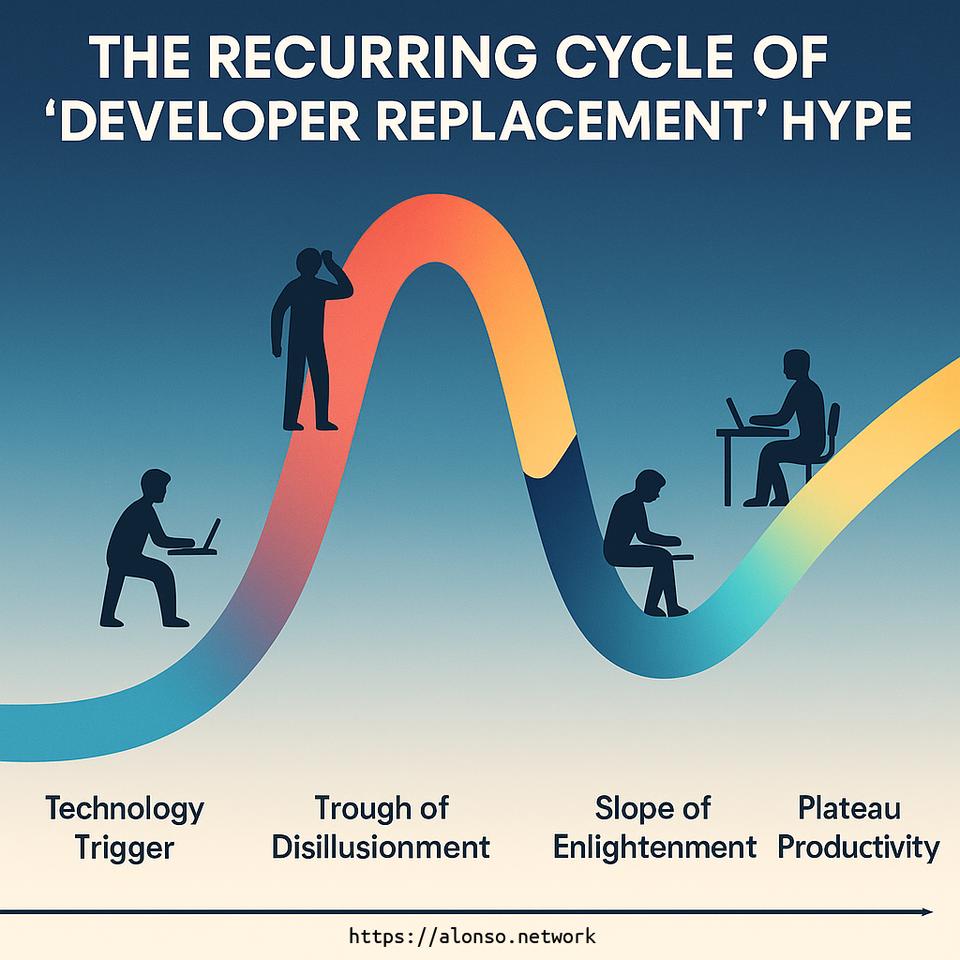The Recurring Cycle of 'Developer Replacement' Hype

From NoCode to AI-Assisted
Every few years, a shiny new technology emerges that promises to make software developers obsolete. The headlines follow a predictable pattern: "The End of Coding," "Anyone Can Build Apps Now," or my personal favorite, "Why Your Five-Year-Old Will Be Programming Before Learning to Read."
The executives get excited. The consultants circle like sharks. PowerPoint decks multiply. Budgets shift.
And then reality sets in.
What actually happens isn't replacement, it's transformation. Technologies that promised to eliminate the need for technical expertise end up creating entirely new specializations, often at higher salary points than before. The NoCode movement didn't eliminate developers; it created NoCode specialists and backend integrators. The cloud didn't eliminate system administrators; it transformed them into DevOps engineers at double the salary.
Now we're witnessing the same pattern with AI-assisted development. The promise that "AI will write all your code" is evolving into the reality that we need engineers who can effectively orchestrate AI systems, which is essentially the same engineers, but now with new skills and higher salary expectations.
But there's something deeper happening with this particular transformation. Unlike previous technological shifts that primarily changed how we implement solutions, AI-assisted development is highlighting a fundamental truth about software engineering that has always existed but is now impossible to ignore:
The most valuable skill in software isn't writing code, it's architecting systems.
And as we'll see, that's the one skill AI isn't close to replacing.
The Endless Carousel of Replacement Promises
How many times have we ridden this merry-go-round? Let's count the rotations:
The NoCode/LowCode Revolution
Remember when drag-and-drop interfaces were going to let business users build their own applications? The promise was clear: "Why hire expensive developers when anyone can build an app?"
What actually happened: These tools created a new class of problems. Someone still needed to design the data models underpinning those shiny interfaces, integrate with existing systems and databases, handle edge cases the visual tools couldn't address, and maintain and upgrade as requirements evolved.
The result wasn't fewer developers—it was the birth of "NoCode specialists" who understood both the business domain and the technical limitations of these platforms. And guess what? They commanded higher salaries than the developers they supposedly replaced.
The Cloud Revolution
"Move to the cloud and you won't need system administrators anymore!"
As if infrastructure would somehow manage itself once it was someone else's server. The cloud didn't eliminate the need for systems expertise. Instead, it transformed what that expertise looked like and dramatically expanded its scope.
The sysadmins weren't eliminated; they were reborn as DevOps engineers with fancy new job titles and substantially higher compensation packages. The work didn't disappear; it evolved into infrastructure-as-code, automated deployment pipelines, and distributed systems management.
As I noted in my LinkedIn post about microservices: "I've watched teams spend months decomposing perfectly functional systems into microservices only to discover they've traded one set of problems for a more expensive set." The cloud enabled this complexity and someone still needed to manage it. That someone was still a systems expert, just operating at a higher level of abstraction.
The Offshore Development Wave
"Why pay local developers when you can get the same work done for a fraction of the cost overseas?"
The promise of dramatic cost savings quickly collided with the reality of communication challenges, quality issues, and the discovery that effective software development requires deep contextual knowledge and continuous collaboration.
What emerged instead was a more nuanced approach: distributed teams with clear ownership boundaries, stronger architecture practices, and—surprise—higher total costs than initially projected.
The AI Coding Assistant Revolution
And now we have AI promising to write our code for us. "Just describe what you want, and the AI will generate it!"
The early reality is already emerging. AI generates plausible-looking code that often contains subtle inconsistencies and errors. Senior engineers spend significant time verifying and correcting AI output. The "vibe coding" phenomenon means experienced developers extract far more value than novices. Systems built entirely with AI assistance often lack coherent architecture.
"In the world of the chisel, you just gave carpenters a CNC machine. Guess who will make the better furniture?"
The pattern is becoming clear once again: the technology doesn't replace the skill, it elevates it to a higher level of abstraction.
Why This Time Is Different
Here's what the "AI will replace developers" crowd fundamentally misunderstands: code is not an asset—it's a liability. Every line must be maintained, debugged, secured, and eventually replaced. The real asset is the business capability that code enables.
If AI makes writing code faster and cheaper, it's really making it easier to create liability. When you can generate liability at unprecedented speed, the ability to manage and minimize that liability strategically becomes exponentially more valuable.
This is particularly true because AI excels at local optimization but fails at global design. It can optimize individual functions but can't determine whether a service should exist in the first place, or how it should interact with the broader system. When implementation speed increases dramatically, architectural mistakes get baked in before you realize they're mistakes.
For agency work building disposable marketing sites, this doesn't matter. For systems that need to evolve over years, it's catastrophic.
The pattern of technological transformation remains consistent—sysadmins became DevOps engineers, backend developers became cloud architects—but AI accelerates everything. The skill that survives and thrives isn't writing code.
It's architecting systems. And that's the one thing AI can't do.
